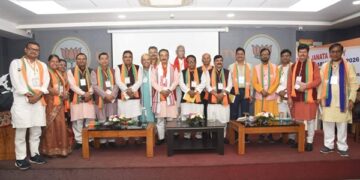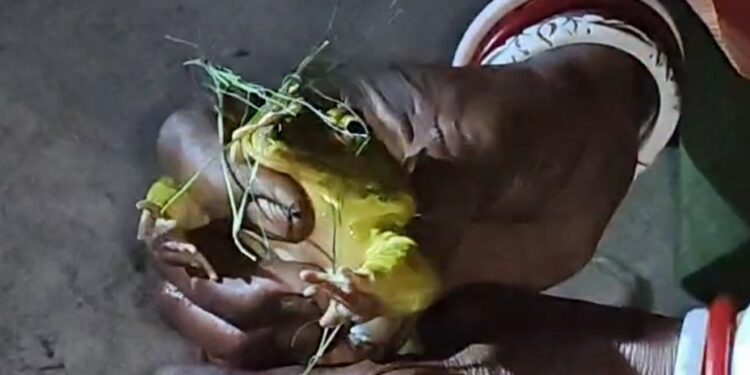Agartala, March 30 – In a remarkable display of tradition and faith, the women of Asharambari village in Tripura’s Khowai district organized a Hindu wedding ceremony for two frogs on Saturday night. This ritual, known as ‘Banger Biye’ (marriage of frogs), was performed with the belief that it would appease the Hindu rain god, Lord Indra, and bring much-needed rainfall to the drought-stricken region.
As per tradition, two toads were married following all the rituals of a Hindu wedding. The ceremony included a ceremonial bath in a pond or river, dressing up the ‘bride’ and ‘groom’ in new clothes, exchanging garlands, and even applying vermillion (sindoor) on the female frog.
The organizers collected contributions from local villagers to conduct the ritual, hoping that it would bring collective benefits. With the onset of rain, they anticipate being able to start farming activities and secure better agricultural yields, as the prolonged dry spell has severely impacted their fields. Unlike previous years, the region has received no rainfall so far, intensifying concerns over the agricultural output.
The entire village came together to witness the unusual wedding, gathering in large numbers to pray for rain. Villagers believe that by performing this sacred custom, they can appease the rain god, who will then bless them with showers and provide relief from the ongoing heatwave and drought conditions.
More than a hundred villagers participated in the ceremony, singing and dancing to the tune of “banger biya,” a folk song traditionally associated with invoking rain.
The event was primarily spearheaded by local women, who emphasized their faith in the tradition. “We don’t know if it will rain, but we have prayed for it. Our ancestors followed this custom, and we are continuing it in the hope that it will bring us relief,” one of the organizers said.
While this ritual may seem unusual, it is not uncommon in many parts of India, where people historically perform such practices to seek divine intervention for rain. At a time when the world is grappling with climate change and global warming, age-old traditions like these continue to reflect the deep-rooted faith of communities in nature’s balance and the power of devotion.








































